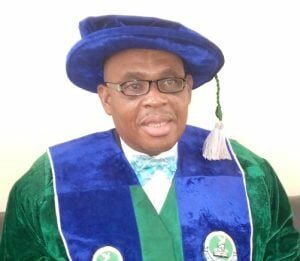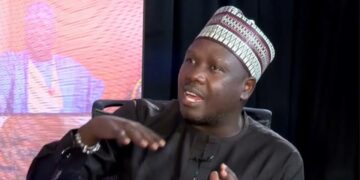The recently appointed Vice-Chancellor of Caleb University, Imota, Lagos, Professor Olalekan Asikhia, has outlined a seven-point agenda to develop the students in critical thinking that will provide solutions to local issues, solve global challenges and embrace Artificial Intelligence and ultimately forging out the total man concept.
Prof Asikhia, who advocated the making of industry-ready graduates, connecting the town with the gown, noted that in the delivery of his seven-point agenda, the university would promote inclusive education that aims to promote and nurture students to become total men.
The Professor of Business Administration, who brings over three decades of experience as an academic, researcher, institutional leader, management consultant, and entrepreneur, disclosed this during a media parley at the university’s Council Chamber listing his vision for the varsity to include creation of a godly environment for dream fulfillment; ensuring academic excellence, enshrining research and innovation; facilitating and maintaining local and international linkage and collaboration; building a World-class entrepreneurial and financially sustainable university; driving enhanced institutional governance and management, and accelerating university’s action on environmental sustainability.
Asikhia stated that the university had put in place the Catered University Academic Potentialisation Scheme, as this would address students whose CGPA were less than 1.5, give them tutorials, help them to catch up, making sure they get the training that will enable them to measure up to their colleagues.
”We want to ensure that research is our culture. That comes first in everything. The reason is because we have a vision. And what is our vision? We want to be one-in-2030. That is, we aim to be number one in Nigeria and number 20 in Africa by 2030. For impact ranking, we want to be number one in Nigeria. We have set up centres of excellence that will drive the vision and achieve it.
“We have about 11 to 12 centres of excellence that are driving all of this vision. We are going to ensure that apart from our collaborations with the industry to ensure we solve industrial problems, we are also going to put in place something that will ensure that every lecturer and student of this university is innovation conscious. In other words, we are living innovatively. We are trying to do things in such a way that new things will be coming up within our environment.
”Also we try to tackle students’ seriousness and students’ absenteeism by what we call Citizenship Committee. The Citizenship Committee is a committee that ensures that students go to class and ensures that students become serious in the light of what they have come to do by enhancing the students’ delivery of excellence,” says Asikhia.
On collaboration strategy, industry and government partnership, he stated, “we have developed a global collaboration strategy in which we bring all the major components of the globe that are supposed to facilitate our vision very close to us. We are trying to drive industry and academia. You could hear the presentation of the DVC academics concerning the ongoing international conference that is talking about smart collaboration, which means it is not about the collaboration combining process.
“It’s about collaboration, ensuring that something new is coming out all the time. This is what we want to do with industry. We want to check within the industry what they are doing that could be done differently.
“We want to check equipment that they don’t have to provide and make this university a center of attraction for industrial players to come and do their business from time to time. This is what we want to make out of the university. We have a five-year projection to accomplish that.
The VC added that plans were ongoing to establish an independent power generation to improve the reliability of on-campus electricity supply after past inefficiencies with contractors.





